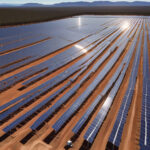In a surprising move that has sent ripples through the Hong Kong real estate market, Adrian Cheng has stepped down as the chief executive officer of New World Development Company, marking a significant shift in leadership for one of Hong Kong’s largest property developers. The resignation comes in the wake of the company’s first annual loss in two decades, highlighting challenges that many businesses face in today’s economic climate.
Adrian Cheng, the third-generation heir of the family business, confirmed his transition to a non-executive director position, with Chief Operating Officer Ma Siu-Cheung taking over the CEO role effective immediately. While Cheng stated his desire to focus on public services and personal commitments, this abrupt shift raises critical questions about the future leadership and strategy of New World Development, which also has interests spanning jewelry, logistics, and hospitality.
For the financial year ending in June, New World reported a staggering net loss of HK$17.1 billion (approximately $2.2 billion), a situation attributed to asset impairments, losses on investments, and rising interest rates. The downturn has been exacerbated by an ongoing slump in the Hong Kong real estate market, as the city continues to lose its status as a prime financial hub. The implications of Cheng’s departure compound these existing challenges, which include significant debt levels that position New World as the most heavily indebted major developer in Hong Kong.
The need for liquidity is becoming increasingly urgent for New World Development. Bloomberg Intelligence analyst Patrick Wong notes that the company may be forced to sell off assets at reduced prices in a bid to raise cash and stabilize its operations after the heavy asset writedowns that have ravaged its balance sheet. The company’s stock has been underperforming significantly, plummeting more than 30% since the beginning of the year, in contrast to a 12.8% decline in the Hang Seng Properties Index.
Market reactions have been mixed; while shares were suspended prior to the announcement due to volatility, New World’s dollar bonds saw a spike following the news of Cheng’s resignation. Investors appear cautiously optimistic, with the 8.625 percent note due in 2028 climbing to just above 93 cents on the dollar. Still, the challenges ahead remain steep with a net debt-to-equity ratio of 82.7%, starkly contrasting with much lower figures from competitors like Henderson Land Development and Sun Hung Kai Properties.
Investment analysts express skepticism regarding whether a change in management can truly resolve the structural problems plaguing New World Development. Sam Wong, an equity analyst from Jefferies LLC, asserts that management change alone cannot address the corporate challenges. According to Wong, “NWD needs to repair its balance sheet in order to meaningfully turn around.” He emphasizes that margin pressures across both residential and retail segments cloud the firm’s prospects.
Despite this critique, industry insiders suggest that Cheng’s departure could ultimately foster renewed investor confidence. According to Jeff Zhang, an analyst at Morningstar Inc., the change in leadership may accelerate the pace of debt repayments, a crucial step towards stabilizing the company’s financial health.
Cheng’s tenure at the helm, which began in 2020 after he distinguished himself as an executive director in 2007, has seen significant transformations within New World Development. A Harvard graduate with a prior stint at Goldman Sachs, Cheng redefined the property developer’s image, merging traditional property management with innovative, arts-focused projects like the K11 Musea Mall. However, this ambitious vision has resulted in accumulated debts that have now come under scrutiny.
The Cheng family’s succession strategy has also come under scrutiny following remarks by Henry Cheng, Adrian’s father and chairman of the family conglomerate, indicating that he was still searching for a successor for the group’s various interests. This revelation shattered prior expectations that Adrian would assume this pivotal role, further complicating the family’s leadership narrative and leaving many in the market wondering who might ultimately guide New World Development through these turbulent times.
With the Cheng family valued at $23.6 billion and ranked among Asia’s wealthiest dynasties, the implications of this leadership change extend beyond just one company. The real estate market in Hong Kong remains an area of concern for both local and international investors, who are keenly watching to see how the new leadership navigates this crisis.
As New World Development seeks to stabilize and redirect its future, one thing is clear: the pressures of debt, shifting market dynamics, and shareholder expectations will require strategic thinking and bold decisions. The coming months will be critical as the new leadership formulates its approach to return New World Development back to profitability and restore its standing in the competitive Hong Kong property market.











